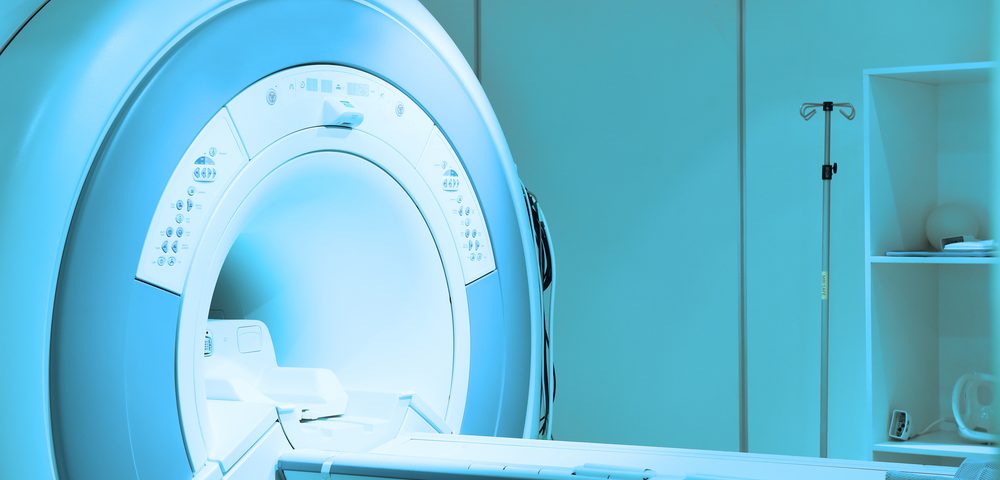The first patients have been injected in a Phase 3 trial investigating the safety and performance of Blue Earth Diagnostics‘ imaging agent rhPSMA-7.3 (18F) in detecting prostate cancer in men with suspected disease recurrence, the company announced.
The SPOTLIGHT trial (NCT04186845) is recruiting patients at several sites in the U.S. and at a single site in Finland. It aims to enroll about 300 men in whom prostate cancer is thought to have returned based on elevated prostate-specific antigen (PSA) levels after treatment.
During the open-label study, participants will be given a single intravenous injection of the investigational imaging agent before undergoing a positron emission tomography (PET) scan. The trial’s main goal is to assess the correct detection rate (CDR) and the positive predictive value (PPV) of rhPSMA-7.3 (18F), using tissue analysis or confirmatory imaging as a standard of truth. Safety of the imaging agent, also determined at 90 days after the injection, is a key secondary measure.
CDR and PPV are both measures of diagnostic performance. CDR measures a test’s ability to correctly identify people with cancer, and PPV the test’s ability to distinguish men with cancer from those without it.
“An important consideration for physicians and their patients is the ability to determine the extent and location of recurrent prostate cancer in order to inform appropriate clinical management … The Phase 3 SPOTLIGHT clinical study is designed to investigate the diagnostic performance of rhPSMA-7.3 (18F) PET imaging as a potential decision-making aid in assessing suspected biochemical recurrence of the disease,” David M. Schuster, MD, FACR, professor at Emory University School of Medicine, and coordinating investigator of SPOTLIGHT, said in a press release.
“Up to 40% of patients who undergo radical prostatectomy [surgical removal of the prostate gland], and up to 50% of patients who undergo radiation therapy will develop local or distant recurrences within 10 years,” Schuster said.
SPOTLIGHT’s design was informed by data from an early clinical study carried out by investigators at Technical University of Munich, involving more than 1,000 men with prostate cancer. Blue Earth also completed a Phase 1 trial (NCT03995888) assessing the safety, distribution, and the amount of ionizing radiation brought on by rhPSMA-7.3 (18F) in healthy volunteers.
rhPSMA-7.3 (18F) is a radiohybrid compound that is made up of a prostate-specific membrane antigen (PSMA)-targeted receptor ligand, which can be taken up by prostate cancer cells, and is bound to the 18F radioisotope. This labels and allows cancer cells to be visualized on a PET scan.
“We selected F18 as the radiolabeling isotope of choice for rhPSMA-7.3 PET based on important attributes, including: a positron energy that enables high resolution PET scans; high yielding chemistry for large batch, centralized manufacturing; and a half-life that enables efficient distribution across broad geographies, to be readily available for patients, independent of select individual hospitals,” said David Gauden, PhD, chief scientific officer of Blue Earth Diagnostics.
In addition to SPOTLIGHT, rhPSMA-7.3 (18F) is being tested in a Phase 3 trial called LIGHTHOUSE (NCT04186819), which is also enrolling men newly diagnosed with prostate cancer at several sites across the U.S. and at a single site in Finland.
LIGHTHOUSE aims to investigate the safety and diagnostic performance of rhPSMA-7.3 (18F) in about 375 newly diagnosed patients.
“We are excited that both of our Phase 3 studies for rhPSMA-7.3 (18F) are well underway and enrolling patients, with the hope that our efforts can help inform more personalized clinical management to address the needs of men with prostate cancer,” said Jonathan Allis, PhD, CEO of Blue Earth Diagnostics.
“Pending successful development and approval of rhPSMA-7.3 (18F), we will be in the unique position to offer complementary products to assist in the clinical management of men with known or suspected prostate cancer,” Allis said.

